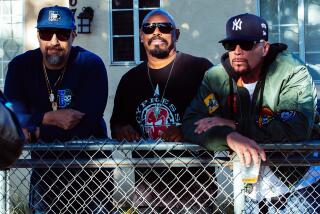KCET Needs New Science Formula
- Share via
Although I am a doctor of infectious diseases by trade, from 1987 to 1993 I also worked for Lifetime Television as an editor, writer and co-anchor for nationally broadcast programs on science and medicine. Strictly speaking, these programs were intended for physicians. In actuality, lay viewers outnumbered health-care professionals 9 to 1. That fact, combined with other experiences in journalism and clinical practice, has me convinced of a public hunger for meaty and (yes! it is possible) entertaining television programs in science and medicine.
Alas, Lifetime Medical Television is no longer--a victim of sponsor budget cuts and network ambivalence over split-personality programming (science and medicine shows all day Sunday versus women-oriented programs the rest of the week). Anyway, that’s ancient history.
Fast-forwarding to 1996, I, like many television viewers, turn to PBS for high-end documentaries, culled from a field of competitive products by some discerning party. Admittedly, I have no idea who that party is, what their science background is or their commitment to informing adult viewers about science. However, I do know these two facts: KCET-TV Channel 28 makes its own programming decisions, and KCET offers relatively little science content outside of “Nova” and animal picture shows.
Given these facts, I naturally take note when KCET devotes a major block of air time to science for the layperson. Last month appeared to be that moment. On Sept. 8 and 9, KCET devoted nearly 10 hours of prime-time and late-night pledge programming to “A Glorious Accident,” a series of scientific-philosophic interviews and round-table discussions with leading academics. According to Judith Michaelson’s article in the Calendar section (“ ‘Glorious’ Thoughts With KCET Fund-Raiser,” Sept. 7), KCET was inspired by the previous “explosive success” of “Accident” in New York (in 1994, a single day’s broadcast drew $215,000 in pledges for WNET).
Ah, the arcane strategies of fund-raising. Well, I don’t know what led to WNET’s windfall, but I wish I had bet money on “Accident’s” bombing in Los Angeles. The net here was $26,000 on the first evening and $32,000 on the second. Those numbers were “good, but not great,” according to the public information office at KCET. Far more telling were the new member subscriptions engendered by “Accident.” In The Times article, KCET was quoted as judging “Accident” a success if it brought in 500 to 1,000 new members. In fact, that Sunday night produced 58 new member subscriptions and Monday night produced 83.
I hope that the good folks at KCET do not imagine that they were serving either science or their viewers’ need for practical science information with “A Glorious Accident.” Probably not, given KCET’s own statement from the outset that the series was “dense and deep and antithetical to what most people’s definition of what television is.” (I’ll second that.)
*
From my vantage, “Accident’s” quasi-scientific speculation might have intrigued a graduate student seminar but more likely discouraged nonscientist, nonacademic viewers. I must confess, paleontologist Stephen Jay Gould especially irritated me. Although his well-publicized theories on the accidental nature of human intelligence are provocative (now you know the origin of the series’ title), his emotional detachment verges on arrogance. If I were in marketing at KCET, professor Gould would not be my choice of motivational speaker.
Finally, it must be stated that “A Glorious Accident” would not have irked me so were it not for an ironic coincidence. Preceding its six-hour marathon on Sept. 8 was a one-hour program barely mentioned in the KCET program guide. Title? “Cholesterol: The Killer Within.” Its lack of publicity in Los Angeles notwithstanding, this program is now drawing high ratings in PBS markets around the country. It’s not too hard to figure that heart disease being the No. 1 killer of women and men in America and worldwide might have something to do with that.
Dear KCET, just as you have addressed the need for a civic forum in Los Angeles, please come back to Earth and consider the true informational needs in science and medicine in our community. We live in times when citizens of all educational backgrounds are estranged from science and technology, barring access to knowledge that could delight, empower and save lives. So let me use a little of your own fund-raising jargon: Accept the challenge.
More to Read
The complete guide to home viewing
Get Screen Gab for everything about the TV shows and streaming movies everyone’s talking about.
You may occasionally receive promotional content from the Los Angeles Times.






